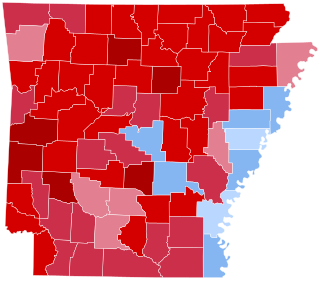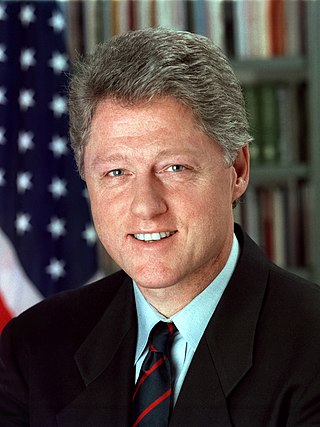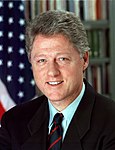
The 1996 United States presidential election was the 53rd quadrennial presidential election, held on Tuesday, November 5, 1996. Incumbent Democratic President Bill Clinton defeated former Senate Majority Leader Bob Dole, the Republican nominee, and Ross Perot, the Reform Party nominee and 1992 independent presidential candidate.

The 1992 United States presidential election was the 52nd quadrennial presidential election, held on Tuesday, November 3, 1992. Democratic Governor Bill Clinton of Arkansas defeated incumbent Republican President George H. W. Bush and independent businessman Ross Perot of Texas. The election marked the end of a period of Republican dominance in American presidential politics that began in 1968, and also marked the end of 12 years of Republican rule of the White House, as well as the end of the Greatest Generation's 32-year American rule and the beginning of the baby boomers' 28-year dominance until 2020. It was the last time the incumbent president failed to win a second term until Donald Trump in 2020.

The New Hampshire presidential primary is the first in a series of nationwide party primary elections and the second party contest, the first being the Iowa caucuses, held in the United States every four years as part of the process of choosing the delegates to the Democratic and Republican national conventions which choose the party nominees for the presidential elections to be held in November. Although only a few delegates are chosen in the New Hampshire primary, its real importance comes from the massive media coverage it receives, along with the first caucus in Iowa.

From February 10 to June 9, 1992, voters of the Democratic Party chose its nominee for president in the 1992 United States presidential election. Despite scandals and questions about his character, Arkansas Governor Bill Clinton won the nomination through a series of primary elections and caucuses culminating in the 1992 Democratic National Convention held from July 13 to July 16, 1992, in New York City. Clinton and Tennessee Senator Al Gore were nominated by the convention for president and vice president, respectively.

From January 19 to June 8, 2004, voters of the Republican Party chose its nominee for president in the 2004 United States presidential election. Incumbent President George W. Bush was again selected as the nominee through a series of primary elections and caucuses culminating in the 2004 Republican National Convention held from August 30 to September 2, 2004, in New York City.
Lyndon LaRouche's United States presidential campaigns were a controversial staple of American politics between 1976 and 2004. LaRouche ran for president on eight consecutive occasions, a record for any candidate, and tied Harold Stassen's record as a perennial candidate. LaRouche ran for the Democratic nomination for President of the United States seven times, beginning in 1980.

The 1996 Democratic National Convention was held at the United Center in Chicago, Illinois, from August 26 to August 29, 1996. President Bill Clinton and Vice President Al Gore were nominated for reelection. It was the first national convention of either party to be held in Chicago since the riots of the 1968 Democratic convention, and until 2024, was the most recent presidential convention held in the city by either major party.

The 1956 Democratic National Convention nominated former Governor Adlai Stevenson of Illinois for president and Senator Estes Kefauver of Tennessee for vice president. It was held in the International Amphitheatre on the South Side of Chicago from August 13 to August 17, 1956. Unsuccessful candidates for the presidential nomination included Governor W. Averell Harriman of New York, Senator Lyndon B. Johnson of Texas, and Senator Stuart Symington of Missouri.

The 2008 Wisconsin fall general election was held on November 4, 2008. All of Wisconsin's eight seats in the United States House of Representatives were up for election. Within the state government, sixteen seats in the Wisconsin State Senate, and all 99 seats in the Wisconsin State Assembly were up for election. At the presidential level, voters chose ten electors to represent them in the Electoral College, which then helped select the president of the United States. The 2008 fall partisan primary was held on September 9, 2008.

The 2000 California Democratic presidential primary took place on March 7, 2000, as one of 16 contests scheduled on Super Tuesday in the Democratic Party primaries for the 2000 presidential election, following the Washington primary the weekend before. It was an open primary, with the state awarding 433 delegates towards the 2000 Democratic National Convention, of which 367 were pledged delegates allocated on the basis of the results of the primary.

The 1986 Illinois gubernatorial election was held on November 4, 1986. Republican candidate James R. Thompson won a fourth term in office, defeating the Illinois Solidarity Party nominee, former United States Senator Adlai Stevenson III, by around 400,000 votes.

The 2016 United States presidential election in the District of Columbia was held on Tuesday, November 8, 2016, as part of the 2016 United States presidential election in which all fifty states and the District of Columbia participated. District of Columbia voters chose electors to represent them in the Electoral College via a popular vote, pitting the Republican Party's nominee, businessman Donald Trump, and running mate Indiana Governor Mike Pence against Democratic Party nominee, former Secretary of State Hillary Clinton, and her running mate Virginia Senator Tim Kaine. The District of Columbia has three electoral votes in the Electoral College. Prior to the election, Clinton was considered to be virtually certain to win Washington DC.

The 2020 United States presidential election in Arkansas took place on Tuesday, November 3, 2020, as part of the 2020 United States presidential election in which all 50 states plus the District of Columbia participated. Arkansas voters chose six electors to represent them in the Electoral College via a popular vote pitting incumbent Republican President Donald Trump and his running mate, incumbent Vice President Mike Pence, against Democratic challenger and former Vice President Joe Biden and his running mate, United States Senator Kamala Harris of California. Also on the ballot were the nominees for the Libertarian, Green, Constitution, American Solidarity, Life and Liberty, and Socialism and Liberation parties and Independent candidates. Write-in candidates are not allowed to participate in presidential elections.

The 2020 United States presidential election in Tennessee was held on Tuesday, November 3, 2020, as part of the 2020 United States presidential election in which all 50 states plus the District of Columbia participated. Tennessee voters chose electors to represent them in the Electoral College via a popular vote, pitting the Republican Party's nominee, incumbent President Donald Trump, and running mate Vice President Mike Pence against Democratic Party nominee, former Vice President Joe Biden, and his running mate California Senator Kamala Harris. Tennessee has 11 electoral votes in the Electoral College.

The 2000 Oklahoma Democratic presidential primary took place on March 14, 2000, as one of 6 contests scheduled the week after Super Tuesday in the Democratic Party primaries for the 2000 presidential election, following the Nevada caucuses the weekend before. The Oklahoma primary was a semi-closed primary, with the state awarding 52 delegates towards the 2000 Democratic National Convention, of which 45 were pledged delegates allocated on the basis of the results of the primary.

The 1996 Illinois Democratic presidential primary was held on March 19, 1996 in the U.S. state of Illinois as one of the Democratic Party's statewide nomination contests ahead of the 1996 presidential election.

The 2000 Arkansas Democratic presidential primary took place on May 23, 2000, as one of two contests scheduled for the Democratic Party primaries for the 2000 presidential election, following the Oregon primary the weekend before. The Arkansas primary was an open primary, with the state awarding 47 delegates towards the 2000 Democratic National Convention, of which 37 were pledged delegates allocated on the basis of the results of the primary.

The 2000 Maryland Democratic presidential primary took place on March 7, 2000, as one of 16 contests scheduled on Super Tuesday in the Democratic Party primaries for the U.S. 2000 presidential election. The Maryland primary was a closed primary, with the state awarding 95 delegates to the 2000 Democratic National Convention, of whom 68 were pledged delegates allocated on the basis of the primary results.























